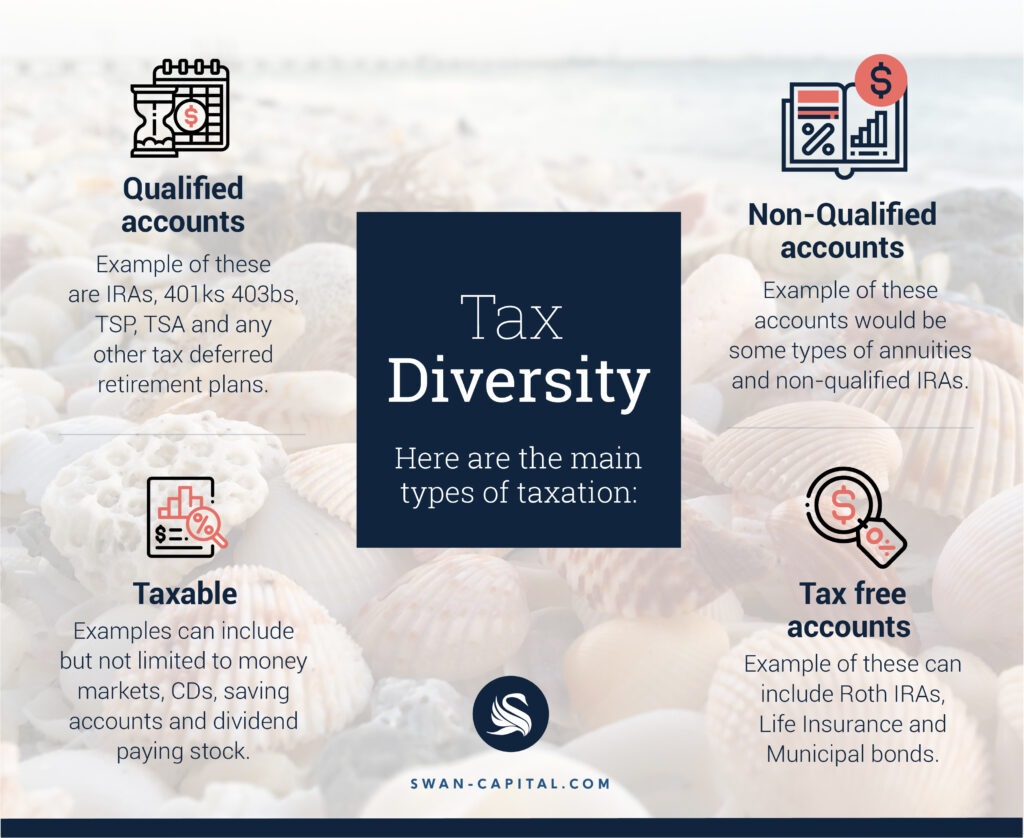Tax Diversify
“If the ladder is not leaning against the right wall, every step we take just gets us to the wrong place faster” – Stephen Covey1
I find that most successful investors are successful savers too. These savers have been climbing the ladder and accumulating assets over a long period of time. However, if we are not careful we can accumulate the wrong assets by climbing the wrong ladder the entire time. It is not our fault they never teach us in school that all money is not created equally. We were told we should diversify our investments, but we were never informed we should diversify our taxes as well.
Here are the main types of taxation:
Qualified accounts – Examples of these are IRAs (except a Roth), 401(k)s 403(b)s, TSP, TSA and any other tax-deferred retirement plans. These plans allow you to defer your income to pay taxes at a future date. Think about these investments like frozen income machines: You delay paying taxes on every dollar and, once you take it out of the freezer, it thaws out and then you have to pay taxes on that amount. The issue with qualified accounts is that the future is unknown; we cannot be sure what taxes will be in the future. Right now, taxes are at historical lows so, if taxes rates increase in the future, you will most likely owe more than you do now. Plus, if you pass away your spouse and children will still owe the taxes on these accounts. If they are single or widowed, their tax brackets may be smaller, forcing them to pay even more taxes than you may be subject to today. Lastly, consider how your retirement accounts are working hard to grow these assets for Uncle Sam, too. He is your business partner, because you still owe him a percentage of your entire account balance. These accounts are my least favorite.
Taxable – Examples include, but are not limited to, money markets, CDs, savings accounts and dividend-paying stocks. These accounts pay interest on a regular basis, which is reported on a tax form known as a 1099R. You pay taxes on this interest every year, even if you don’t have access to the funds. For example, with a 5-year CD, you still have to pay taxes to Uncle Sam even though the funds are illiquid. The issue with taxable accounts is that you had already paid income taxes on this money before you deposited it into the taxable account. As if that is not enough, as you earn interest on your investment you pay taxes againwhich feels a lot like paying taxes twice. I always joke that’s this is one of the reasons we left Great Britain in the first place. With taxable accounts, we are getting better, but they are far from perfect.
Non-Qualified accounts – Examples of these accounts are non-qualified IRAs and some types of annuities. With these accounts, you have already paid taxes on your income before making the deposit, but unlike taxable accounts – you only pay taxes when you close the account or take a distribution. These can be more tricky because you have to track the cost basis of what you contribute to them, separate from the capital gains that accrue within the plan. These accounts are nice because at least you get to be in charge of when you pay taxes and can choose what year is best to do that, unlike taxable accounts.
Tax free accounts – Examples of these include Roth IRAs, life insurance and municipal bonds. All of these types of accounts have their pros and cons. However, they share the great underlying feature of being tax free. You pay income taxes upfront on your initial deposit. What is unique about these vehicles is that once you have paid taxes on that contribution, you are done with taxes and can position them for long-term growth because they are often the last account you access. Tax-free accounts are my favorite because they take the guess work out of future taxation.
It has never been wise to put all your eggs in one basket, and this principle holds true with the tax status of your accounts as well. Consider diversifying your taxes by having various types of tax vehicles for your retirement savings. By diversifying, you can be better prepared for the ever-changing tax landscape. By being intentional when you save for your retirement, you can ensure you are climbing up the right ladder.

1 Stephen Covey; “The 7 Habits of Highly Effective People” (New York: Simon & Schuster, 1988) Investment advisory services offered only by duly registered individuals through Swan Capital. SWAN Capital are not affiliated companies. All investments are subject to risk including the potential loss of principal. No investment strategy can guarantee a profit or protect against loss in periods of declining values. This content is provided for informational purposes only and is not intended to serve as the basis for financial decisions. Neither the firm nor its agents or representatives may give tax or legal advice. Individuals should consult with a qualified professional for guidance before making any purchasing decisions. 00664800
Thought this info was useful?
Please share it on your social media platforms!
Ready to Take the Next Step?
For more information about any of our products and services, schedule a meeting today or register to attend a seminar.
 Download this 8-page guide was created for you to better understand how taxes could affect your retirement income.
Download this 8-page guide was created for you to better understand how taxes could affect your retirement income.